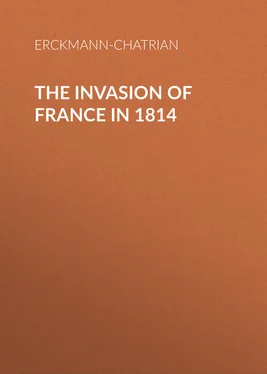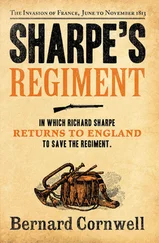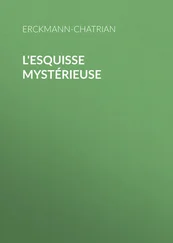Erckmann-Chatrian - The Invasion of France in 1814
Здесь есть возможность читать онлайн «Erckmann-Chatrian - The Invasion of France in 1814» — ознакомительный отрывок электронной книги совершенно бесплатно, а после прочтения отрывка купить полную версию. В некоторых случаях можно слушать аудио, скачать через торрент в формате fb2 и присутствует краткое содержание. Жанр: foreign_antique, foreign_prose, Историческая проза, на английском языке. Описание произведения, (предисловие) а так же отзывы посетителей доступны на портале библиотеки ЛибКат.
- Название:The Invasion of France in 1814
- Автор:
- Жанр:
- Год:неизвестен
- ISBN:нет данных
- Рейтинг книги:3 / 5. Голосов: 1
-
Избранное:Добавить в избранное
- Отзывы:
-
Ваша оценка:
- 60
- 1
- 2
- 3
- 4
- 5
The Invasion of France in 1814: краткое содержание, описание и аннотация
Предлагаем к чтению аннотацию, описание, краткое содержание или предисловие (зависит от того, что написал сам автор книги «The Invasion of France in 1814»). Если вы не нашли необходимую информацию о книге — напишите в комментариях, мы постараемся отыскать её.
The Invasion of France in 1814 — читать онлайн ознакомительный отрывок
Ниже представлен текст книги, разбитый по страницам. Система сохранения места последней прочитанной страницы, позволяет с удобством читать онлайн бесплатно книгу «The Invasion of France in 1814», без необходимости каждый раз заново искать на чём Вы остановились. Поставьте закладку, и сможете в любой момент перейти на страницу, на которой закончили чтение.
Интервал:
Закладка:
"Excellent!" said he; "everybody is making holiday here. The allies will be well received."
In front of the College, the squeaky voice of the Sergeant-de-ville Harmentier was proclaiming: —
"Let it be known that the casemates are to be opened: therefore everybody may take a mattress there, and two blankets each. And the commissaries of this place are going to commence their rounds of inspection, to ascertain that each inhabitant possesses food for three months in advance, which he must certify. – This day, 20th December, 1813. – JEAN PIERRE MEUNIER, Governor ."
All this Hullin saw and heard in less than a minute, for the whole town was in the greatest excitement. Strange, serious, and comic scenes succeeded each other without interruption.
Near the narrow street leading to the Arsenal, a few National Guards were drawing a twenty-four pounder. These honest fellows had a very steep ascent to climb; they could do no more. "Ho! all together! Mille tonnerres! Once again! Forward!" They all shouted at once, pushing the wheels, and the great cannon, stretching out its long neck over its immense carriage, above their heads, rolled slowly along, making the pavement tremble.
Hullin, quite rejoiced, was no longer the same man. His soldier-like instincts, the remembrance of the bivouac, of the marches, of the firing, and of the battles – all returned. His eyes sparkled, his heart beat faster, and already thoughts of defence, of entrenchments, of death-struggles came and went in his head.
"Faith!" said he, "all goes well! I have made enough shoes in my life, and since the occasion to take up the musket presents itself, well, so much the better: we will show the Prussians and Austrians that we have not forgotten to charge at the double."
Thus reasoned the good man, carried away by his warlike instincts; but his joy did not last long.
Before the church, on the place-d'armes , were standing fifteen or twenty carts, full of wounded, arrived from Leipzig and Hanau. These unhappy creatures, pale, ghastly, heavy-eyed, some whose limbs were already amputated, others with their wounds still untouched, tranquilly awaited death. Near them, a few worn-out jades were eating their meagre allowance, while the conductors, poor wretches, who had been brought into requisition in Alsace, wrapped in their old mantles, slept notwithstanding the cold – their great hats turned down over their faces and their arms folded – on the steps of the church. One shuddered to see these sad groups of men, with their gray hoods, heaped up on the bloody straw – one carrying his broken arm on his knees; another with his head bandaged in an old handkerchief; a third, already dead, being used as a seat for the living, his black hands hanging down the ladder. Hullin, in front of this mournful spectacle, stopped rooted to the ground. He could not lift his eyes from it. Great human suffering has this strange power of fascination over us: we look to see men perish, how they regard death: the best among us are not exempt from this frightful curiosity. It seems as though eternity is going to deliver up its secret!
There, then, near the shafts of the first cart, to the right of the file, were crouched two carbineers in little sky-blue vests, veritable giants, whose powerful natures gave way under the clutch of pain: like two caryatides crushed by the weight of some heavy mass. One, with great red mustaches and ashy cheeks, looked at you out of his sunken eyes, as though from the depths of some fearful nightmare; the other, bent double, with blue hands, and shoulder torn by shot, sank more and more; then would raise himself with a jerk, talking softly as though dreaming. Behind lay stretched, two and two, some infantry soldiers, the greater number struck by ball, with a leg or an arm broken. They seemed to support their fate with more firmness than the giants. These poor creatures said nothing: a few only, the youngest, furiously demanded water and bread; and in the next cart, a plaintive voice – the voice of a conscript – called, "My mother! my mother!" while the older men smiled gloomily, as though to say: "Yes, yes, she will come, thy mother!" Perhaps they did not think of anything all the time.
Now and then a shudder would pass along the whole of them. Then several wounded could be seen half lifting themselves, with deep groans, and falling back as if death had gone its rounds at that moment.
And again everything relapsed into silence. While Hullin was watching, and feeling sick to his heart's core, a shopkeeper in the vicinity, Sôme the baker, came out of his house carrying a large basin of soup. Then you should have seen all these spectres move, their eyes sparkle, their nostrils dilate; they seemed born again. The unhappy fellows were dying of hunger!
Good Father Sôme, with tears in his eyes, approached, saying, "I am coming, my children. A little patience! It is I, you know me!"
But hardly was he near the first cart, when the great carbineer with the ashy cheeks, reviving, plunged his arm up to the elbow in the boiling basin, seized the meat, and hid it under his vest. It was done with the rapidity of lightning. Savage yells arose on all sides: those men, if they had had strength to move, would have devoured their comrade. He, his arms pressed tightly to his chest, the teeth on has prey, and glaring round him, appeared to hear nothing. At these cries an old soldier, a sergeant, rushed out of the nearest inn. He was an old hand; he understood at once what it was about, and, without useless reflections, he tore away the meat from the wild beast, saying to him, "Thou dost not deserve any! It must be divided into parts. We will cut ten rations!"
"We are only eight!" said one of the wounded, very calm to all appearance, but with eyes gleaming out of their bronze mask.
"How, eight?"
"You can see, sergeant, that those two are dying fast: it would be so much food lost!"
The old sergeant looked.
"Eight," said he; "eight rations!"
Hullin could bear it no longer. He went over to the innkeeper Wittmann's opposite, as white as death; Wittmann was also a fur and leather merchant. Seeing him enter, "Hé! is it you, Master Jean-Claude?" he exclaimed. "You arrive sooner than usual; I did not expect you till next week." Then seeing how he staggered – "But say, you are ill?"
"I have just seen the wounded."
"Ah, yes! the first time, it shocks you; but if you had seen fifteen thousand pass, as we have, you would not think anything more about it."
"A glass of wine, quick?" said Hullin, who felt badly. "Oh, mankind, mankind! And to think that we are brothers!"
"Yes, brothers until it touches your purse," replied Wittmann. "Come, drink! that will set you right."
"And you have seen fifteen thousand go by?" rejoined the shoemaker.
"At the least, for two months, without speaking of those who have remained in Alsace and the other side of the Rhine; for, you comprehend, they cannot find carts enough for all, and then many are not worth the trouble of being carried away."
"Yes, I comprehend! But why are they there, those poor creatures? Why do they not go into the hospital?"
"The hospital! What is one hospital, ten hospitals, for fifty thousand wounded? Every hospital, from Mayence and Coblentz as far as Phalsbourg, is crowded. And, besides, that terrible fever, typhus, you see, Hullin, kills more than the bullet. All the villages of the plain twenty leagues round are infected with it; they die everywhere like flies. Luckily the town has been in a state of siege these three days; the gates will be closed, and no more will enter. I have lost, for my part, my Uncle Christian and my Aunt Lisbeth, as healthy, solid people as you and I, Master Jean-Claude. At last the cold has arrived; last night there was a white frost."
"And the wounded remained on the pavements all night?"
Читать дальшеИнтервал:
Закладка:
Похожие книги на «The Invasion of France in 1814»
Представляем Вашему вниманию похожие книги на «The Invasion of France in 1814» списком для выбора. Мы отобрали схожую по названию и смыслу литературу в надежде предоставить читателям больше вариантов отыскать новые, интересные, ещё непрочитанные произведения.
Обсуждение, отзывы о книге «The Invasion of France in 1814» и просто собственные мнения читателей. Оставьте ваши комментарии, напишите, что Вы думаете о произведении, его смысле или главных героях. Укажите что конкретно понравилось, а что нет, и почему Вы так считаете.












